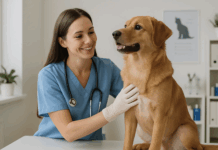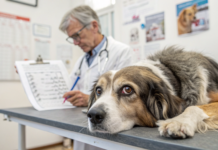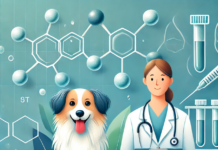Last Updated on March 5, 2025 by Dogs Vets
As a dog owner, you never want to see your furry friend become ill. Being able to spot the signs early when they do is a useful skill to have. Dog ownership is one of the most important responsibilities you will have, so understanding when they are feeling unwell and what to do will mean you can help them quickly.
Dogs, much like humans, can experience a range of illnesses that may affect their health and behaviour. However, because our canine companions can’t verbally tell us when they’re sick, it’s crucial to be vigilant and know the signs to watch for. Early detection of illness not only spares your pet from discomfort but can also make a significant difference in treatment success. Here, we’ll look at some of the key symptoms of sickness in dogs, helping you understand when it might be time to visit your vet.
Common Signs of Illness in Dogs
When it comes to identifying whether your dog might be sick, it isn’t always obvious what the problem might be. Symptoms can be physical, behavioural, or even visible changes that might seem minor but could indicate a serious health issue.
Below you will find some of the most common to look out for, but, as advised by veterinarian Dr Lily Richards writing for insurance provider Petgevity, it’s important to try not to diagnose your dog yourself – it’s easy to misinterpret what’s wrong and delay proper treatment. If in doubt, visit your vet.
Physical Symptoms
Physical signs of illness in dogs may include a sudden change in appetite whether an increase or decrease in eating. Similarly, abnormal stool consistency, frequency, or colour, along with vomiting, may indicate gastrointestinal problems.
Be on the lookout for excessive coughing, sneezing, panting, or laboured breathing, which could suggest respiratory issues. Additionally, frequent urination or the presence of blood in urine might point to urinary tract infections or other kidney-related problems.
Behavioural Changes
Behavioural changes are often the most noticeable and concerning. If your normally energetic dog is showing signs of lethargy, indifference to activities they usually enjoy or is sleeping more than usual, this may indicate a problem. Sudden aggression or unusual withdrawal can be signs of discomfort or pain. If your dog starts to hide or avoids being touched, these are also signs that something may be wrong.
Visible Changes
Observe your dog’s external appearance as well. A dull, lifeless coat or unexplained weight loss or gain can indicate health issues. Look for signs of pain or discomfort, such as limping or difficulty standing up or lying down. Red, watery eyes or excessive scratching might suggest allergies or infections.
Being aware of these signs is crucial because dogs tend to hide discomfort and pain. Regularly monitoring your pet’s normal behaviour and physical condition can help you catch these subtle yet significant changes early.
If you observe any of these symptoms, consider them as potential warnings and consult your vet for a thorough examination to properly diagnose an issue. Remember, the sooner an issue is identified, the better the chances of successful treatment.
What Causes These Symptoms?
The symptoms of illness in dogs can stem from a variety of health issues, each with its own implications:
- Gastrointestinal Issues – Common symptoms of gastroenteritis like loss of appetite, vomiting, or diarrhoea can be caused by something as simple as eating something they shouldn’t have such as chocolate or as complex as infections, parasites, or chronic diseases like pancreatitis or inflammatory bowel disease (IBD).
- Infectious Diseases – Respiratory symptoms such as coughing and sneezing, or urinary issues like frequent urination, can be indicative of infectious diseases. These could range from common viruses and bacteria to more severe conditions such as kennel cough or leptospirosis.
- Allergies and Autoimmune Diseases – Allergic reactions can lead to symptoms such as itchy skin, red eyes, and respiratory issues. Autoimmune diseases can show in various ways, including mobility issues and joint pain, skin lesions, fever, and overall lethargy.
When to Seek Veterinary Help
You should consider immediate veterinary care if your dog is showing severe symptoms such as prolonged vomiting or diarrhoea, difficulty breathing, or signs of severe pain like whining or shaking. Other urgent symptoms include seizures, collapse, or any sudden change in behaviour or consciousness.
Each of these conditions requires a different approach to treatment, which is why recognising the signs and consulting with a vet is important. As veterinary care can be costly, having pet insurance relieves some of the financial stress associated with treatment. It allows you to focus on the best possible care for your dog when they become sick rather than worrying about the expense and how to pay for it.
A good pet insurance plan can cover a significant portion if not all of the veterinary costs, depending on the policy. Ensuring your dog can receive timely medical attention, which can be crucial in the case of severe or chronic conditions, makes the investment worth it whether paying monthly or annually. Ultimately you want to provide peace of mind that you are prepared for unforeseen health issues.
For less severe but persistent symptoms such as mild lethargy, slight changes in appetite, or minor coughing, schedule a visit to the vet if these issues last more than a couple of days. It’s always better to be cautious as early intervention can prevent more serious health problems and can often lead to a simpler, more effective treatment. Remember, you know your dog best, so trust your instincts if you feel something is off.
Helping Your Dog Live Its Best Life
Being proactive about your dog’s health not only helps in the early detection of illnesses but also enhances their quality of life. After all, you want them to enjoy every day to the fullest, so any way you can prevent your dog from common issues is a good idea for their long-term health.
Regular vet check-ups, staying up to date with vaccinations, and maintaining a healthy diet are important. Additionally, keep a close eye on your dog’s behaviour and physical condition when you interact with them each day.
Remember, the better you understand the signs of sickness, the more effectively you can act to ensure your pet receives the right care at the right time. Stay observant, consult your vet whenever you notice something isn’t quite right, and keep your furry friend healthy and happy for years to come.
Fact Check
We strive to provide the latest valuable information for pet lovers with accuracy and fairness. If you would like to add to this post or advertise with us, don’t hesitate reach us. If you see something that doesn’t look right, contact us!























